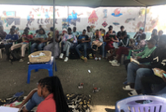Meaning
Silaha za siku hizi ni kalamu na karatasi.
Today's weapons are pen and paper.
- Swahili proverb
Part of the reason this proverb is true is that words often motivate and regulate how people use violence and force. For example, through law, the words of leaders, judges and juries have the power to jail people or even kill them. Making a fiery speech to an angry mob might cause a violent riot (see Julius Caesar).
You furnish the pictures and I'll furnish the war.
- William Randolph Hearst
The proverb also reminds us of the power of nonviolent resistance to bring about lasting political change, a principle advocated and demonstrated by figures like Mahatma Gandhi, Martin Luther King, and Nelson Mandela. (Check out Henry David Thoreau's classic Essay, "Civil Disobedience" and Sophocles famous play, "Antigone")
Origin
Some sources attribute the proverb to the Story of Ahikar (which is also the source of the proverb "A bird in the hand is worth two in the bush"). In this edition, the translator was unable to decipher the damaged manuscript and left the sentence unfinished. (Page 171/274)
(FRAGMENTS)
Watch carefully over thy mouth ...... and make thy heart slow(?), for the word spoken is like a bird, and he who utters it is like a man without ...
... the craft of the mouth is mightier than the craft of ......
A similar phrase also appears in the Old Testament:
For the word of God is quick, and powerful, and sharper than any two-edged sword.
Hebrews 4:12 (KJV)
And in Shakespeare:
Many wearing rapiers are afraid of goosequills.
-William Shakespeare Hamlet Act 2, scene II (page 59)
Do you agree that the pen is mightier than the sword? Share your opinions below!




























